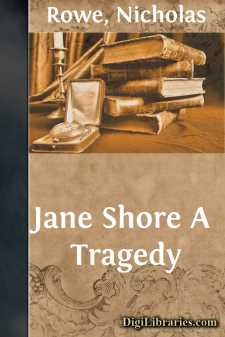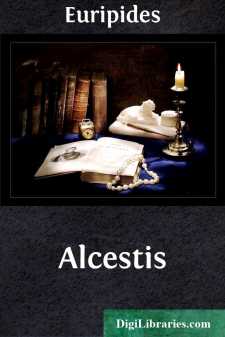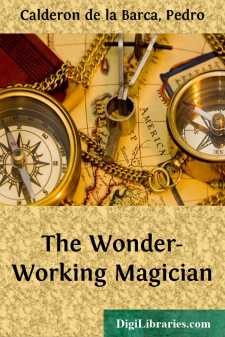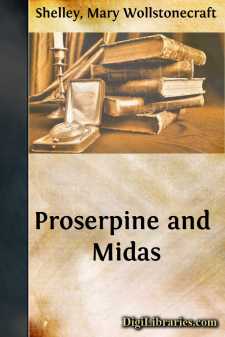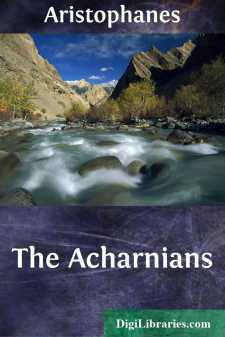Drama
- American 43
- Ancient, Classical & Medieval
- Asian 7
- Caribbean & Latin American 2
- Continental European 50
- English, Irish, Scottish, Welsh 91
- General 105
- Middle Eastern 1
- Religious & Liturgical 1
- Shakespeare 1
Ancient, Classical & Medieval Books
Sort by:
by:
Nicholas Rowe
ACT THE FIRST. SCENE I. THE TOWER. Enter the Duke of Gloster, Sir Richard Ratcliffe, and Catesby. Glos.Thus far success attends upon our councils,And each event has answer'd to my wish;The queen and all her upstart race are quell'd;Dorset is banish'd, and her brother Rivers,Ere this, lies shorter by the head at Pomfret.The nobles have, with joint concurrence, nam'd meProtector of...
more...
by:
John Drinkwater
SCENE ICromwell'shouse at Ely, about the year 1639. An early summer evening. The window of the room opens on to a smooth lawn, used for bowling, and a garden full of flowers.Oliver'swife,Elizabeth Cromwell, is sitting at the table, sewing. In a chair by the open windowMrs. Cromwell, his mother, is reading. She is eighty years of age.Mrs. Cromwell:Oliver troubles me, persuading everywhere....
more...
by:
Euripides
ALCESTIS CHARACTERS OF THE PLAY ADMÊTUS, King of Pherae in Thessaly.ALCESTIS, daughter of Pelias, his wife.PHERÊS, his father, formerly King but now in retirement.TWO CHILDREN, his son and daughter.A MANSERVANT in his house.A HANDMAID. The Hero HERACLES.The God APOLLO.THANÁTOS or DEATH.CHORUS, consisting of Elders of Pherae. "The play was first performed when Glaukînos was Archon, in the 2nd...
more...
INTRODUCTION. Two of the dramas contained in this volume are the most celebrated of all Calderon's writings. The first, "La Vida es Sueno", has been translated into many languages and performed with success on almost every stage in Europe but that of England. So late as the winter of 1866-7, in a Russian version, it drew crowded houses to the great theatre of Moscow; while a few years...
more...
ACT THE FIRST. SCENE I. A Grove before the Temple of Diana. IPHIGENIA.Beneath your leafy gloom, ye waving boughsOf this old, shady, consecrated grove,As in the goddess' silent sanctuary,With the same shudd'ring feeling forth I step,As when I trod it first, nor ever hereDoth my unquiet spirit feel at home.Long as the mighty will, to which I bow,Hath kept me here conceal'd, still, as at...
more...
INTRODUCTION. I. ‘The compositions published in Mrs. Shelley’s lifetime afford but an inadequate conception of the intense sensibility and mental vigour of this extraordinary woman.’ Thus wrote Dr. Garnett, in 1862 (Preface to his Relics of Shelley). The words of praise may have sounded unexpectedly warm at that date. Perhaps the present volume will make the reader more willing to subscribe, or...
more...
Act I. A Representation at the Hotel de Bourgogne. The hall of the Hotel de Bourgogne, in 1640. A sort of tennis-court arranged and decorated for a theatrical performance. The hall is oblong and seen obliquely, so that one of its sides forms the back of the right foreground, and meeting the left background makes an angle with the stage, which is partly visible. On both sides of the stage are benches....
more...
by:
Aristophanes
SCENE: A farmyard, two slaves busy beside a dungheap; afterwards, in Olympus. FIRST SERVANT Quick, quick, bring the dung-beetle his cake. SECOND SERVANT Coming, coming. FIRST SERVANT Give it to him, and may it kill him! SECOND SERVANT May he never eat a better. FIRST SERVANT Now give him this other one kneaded up with ass's dung. SECOND SERVANT There! I've done that too. FIRST SERVANT And...
more...
by:
John Dryden
INTRODUCTORY NOTE The age of Elizabeth, memorable for so many reasons in the history of England, was especially brilliant in literature, and, within literature, in the drama. With some falling off in spontaneity, the impulse to great dramatic production lasted till the Long Parliament closed the theaters in 1642; and when they were reopened at the Restoration, in 1660, the stage only too faithfully...
more...
by:
Aristophanes
INTRODUCTION This is the first of the series of three Comedies—'The Acharnians,' 'Peace' and 'Lysistrata'—produced at intervals of years, the sixth, tenth and twenty-first of the Peloponnesian War, and impressing on the Athenian people the miseries and disasters due to it and to the scoundrels who by their selfish and reckless policy had provoked it, the consequent...
more...


